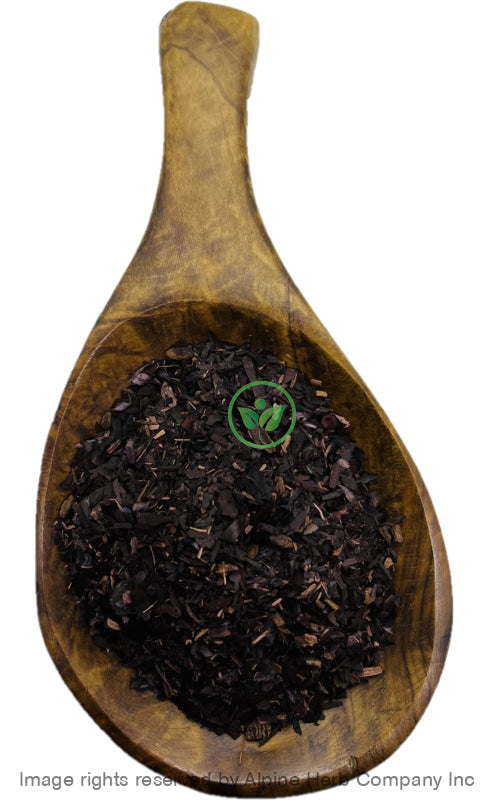Alkanet Root Cut Alpine Herb Company Inc.
$ 12,49 $ 7,49
Botanical Name: Batschia canescens
Common Name:
- English: Alkanet, Hoary puccoon
- Also, known as: Dyer’s Bugloss, Spanish Bugloss, Anchusa, Orchanet, Ratanjot, Surulpattai, Ratthapaalai, Dineshavali, Vambalam Pattai,
Origin: India
Harvested: Cultivated
Parts Used: Root
General Information:
Alkanet is cultivated in Central and Southern Europe for its dye, which is readily extracted by oils and the spirit of wine. It is used in the pharmaceutical industry to give a red color to salves and in staining wood in imitation of rosewood, or mahogany. This is done by rubbing it with oil in which the Alkanet root has been soaked. The name Anchusa is derived from the Greek word anchousa meaning paint. The use of the root as a dye.
The species are hispid or pubescent herbs, with oblong, entire leaves, and bracketed racemes, rolled up before the flowers expand. The corolla is rather small, between funnel and salver-shaped; usually purplish-blue, but in some species yellow or whitish; the calyx enlarges in fruit. The root, which is often very large in proportion to the size of the plant, yields in many of the species a red dye from the rind.
Alkanet is a popular coloring agent for crafts, soaps, ointments, lip balms, and other personal beauty care recipes. The colorful root yields a vibrant ruby red-purple color.
Alkanet was and still is a natural beauty secret, used similarly to Henna. In fact, a classic beauty guide suggests an Alkanet preparation for naturally colored rosy-pink nails!
Precautions:
Not recommended for internal use.
You should consult with a qualified healthcare practitioner before using any herbal products, particularly if you are pregnant, nursing, or on any medications.
All information on this website is for educational purpose ONLY
This information has not been evaluated by Health Canada.
This information is not intended to diagnose, treat, cure, or prevent any disease.
| Unit Size | 100g, 200g, 400g, 1kg |
|---|
Prompt shipping and expert packing
Thanks to our longstanding association with UPS FedEx DHL as well as other leading global carriers, we can offer a variety shipping options. Our warehouse staff is highly trained and will be able to pack your goods in accordance with our precise and exact specifications. Your items will go through an exhaustive examination before they will be securely packaged before being delivered. We ship to hundreds of thousands of customers daily in different countries. This is a sign of our determination to become the largest online retailer worldwide. Warehouses and distribution centers are located throughout Europe as well as in the USA.
Note that orders containing multiple items are processed according to the particular item.
We will thoroughly inspect all items ordered before shipping. Most orders are shipped within 48 hours. The delivery time will be between 3 and 7 working days.
Returns
The stock market is always changing. It's not entirely managed by us since we're involved with several entities, including the factory and the storage. Therefore, the actual inventory could fluctuate at any moment. Please be aware that it is possible that your order could be out of stock after you've placed your order.
Our policy lasts for 30 days. If it's been more than 30 days since the date you purchased your item We're sorry to say that we can't offer you a full exchange or refund.
You can only return a product if it is unused and still in the same state as when you received it. The item should be in the original packaging.


































